2025年中考英语一般现在时复习课件(共21张PPT)
文档属性
| 名称 | 2025年中考英语一般现在时复习课件(共21张PPT) |
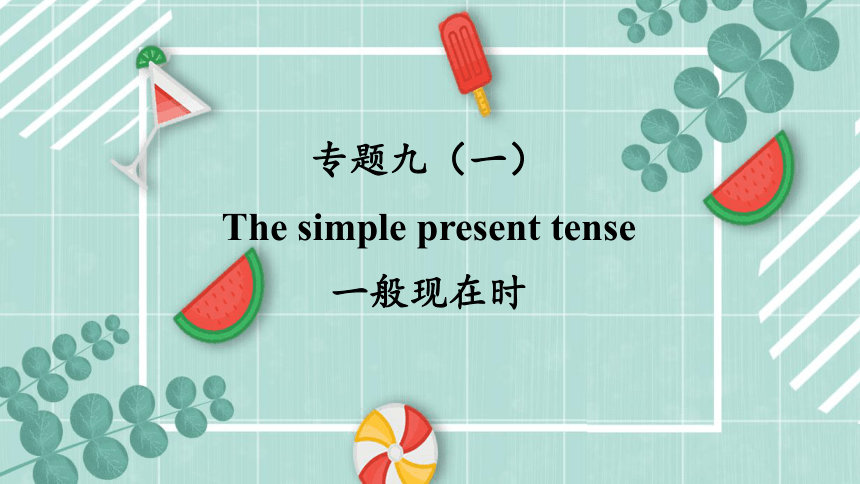
|
|
| 格式 | pptx | ||
| 文件大小 | 22.8MB | ||
| 资源类型 | 教案 | ||
| 版本资源 | 通用版 | ||
| 科目 | 英语 | ||
| 更新时间 | 2024-08-30 09:51:23 | ||
图片预览


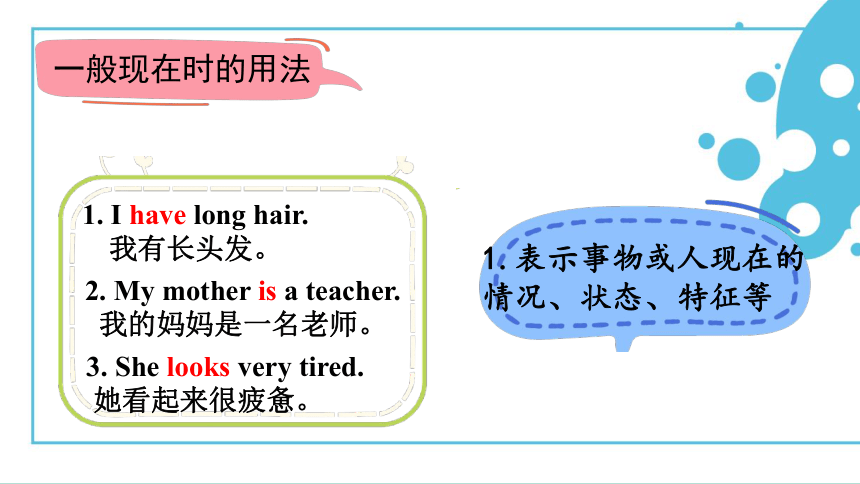
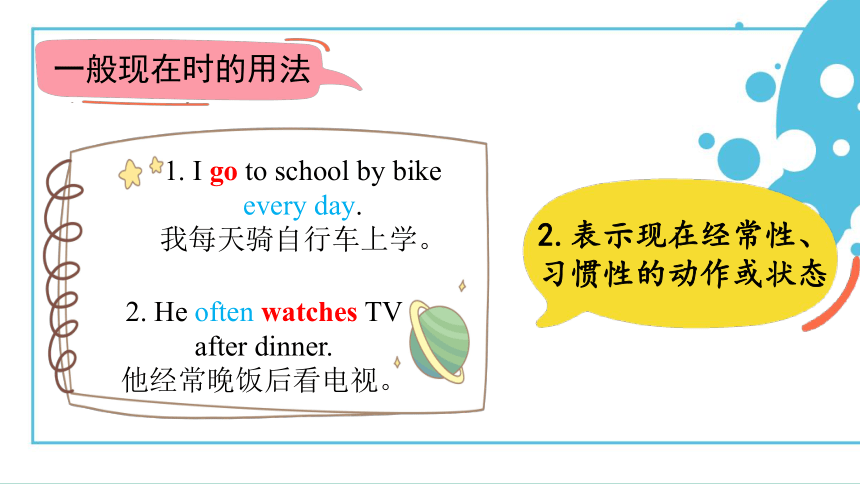


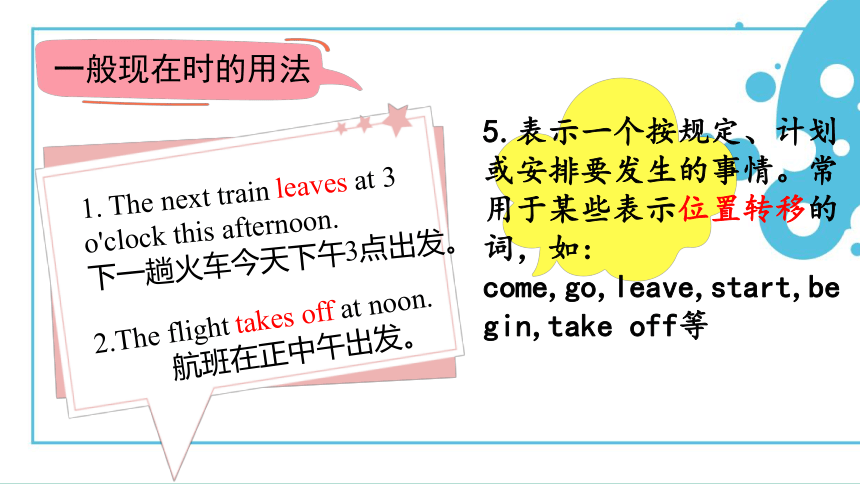

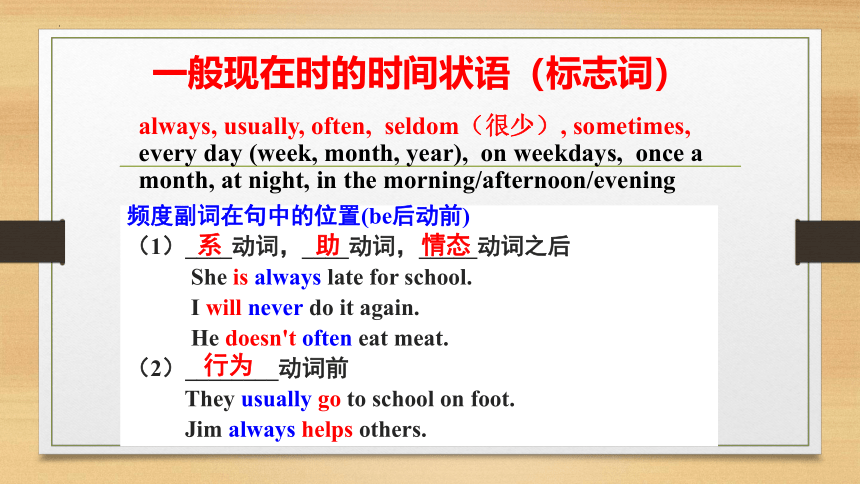
文档简介
(共21张PPT)
专题九(一)
The simple present tense
一般现在时
1.定义
表示现阶段经常性或习惯性反复发生的动作或存在的状态。
He is 20 now.(现在他20岁。)(状态)
He always plays football after school.
(他总是放学后踢足球。)(动作)
一般现在时
一般现在时的用法
2. My mother is a teacher.
我的妈妈是一名老师。
1. I have long hair.
我有长头发。
1.表示事物或人现在的情况、状态、特征等
3. She looks very tired.
她看起来很疲惫。
一般现在时的用法
2. He often watches TV after dinner.
他经常晚饭后看电视。
1. I go to school by bike every day.
我每天骑自行车上学。
2.表示现在经常性、
习惯性的动作或状态
一般现在时的用法
3. Guangzhou lies in the south of China.
广州位于中国的南部
1. The Earth goes around the Sun.
地球绕着太阳转。
3.表示客观事实和普遍真理
2. The teacher told us that the earth goes around the sun.
老师告诉我们地球绕着太阳转。
一般现在时的用法
2. Two heads are better than one.
三个臭皮匠,胜过诸葛亮。
1. An apple a day keeps the doctor away.
一天一苹果,医生远离我。
4.格言警句
一般现在时的用法
2.The flight takes off at noon.
航班在正中午出发。
1. The next train leaves at 3 o'clock this afternoon.
下一趟火车今天下午3点出发。
5.表示一个按规定、计划或安排要发生的事情。常用于某些表示位置转移的词,如:
come,go,leave,start,begin,take off等
一般现在时的用法
2. He will go to the park if it doesn't rain tomorrow.
如果明天不下雨,他就去公园。
1. I will call you as soon as I arrive at the airport.
我一到机场就会给你打电话。
6.在时间、条件和让步状语从句中经常用一般现在时来表示将来的事情,即“主将从现”原则。如:
频度副词在句中的位置(be后动前)
(1)____动词,____动词,_____动词之后
She is always late for school.
I will never do it again.
He doesn't often eat meat.
(2)________动词前
They usually go to school on foot.
Jim always helps others.
always, usually, often, seldom(很少), sometimes, every day (week, month, year), on weekdays, once a month, at night, in the morning/afternoon/evening
一般现在时的时间状语(标志词)
系
助
情态
行为
副词及
副词短语
always 总是
usually 通常
often 常常
sometimes 有时
seldom 很少
never 从未
100%
0%
常见的频度副词按频率大小排列如下:
always(100%)>usually(80%)>often(60%)>
sometimes(40%)>seldom(20%)>never(0%)
一般现在时态的基本句式:
一、 be 动词的一般现在时的句式:
e.g. He is a worker.
You are thirteen.
They are in the classroom.
e.g. He is not (isn’t)a worker.
You are not (aren’t) thirteen.
They are not (aren’t) in the classroom.
肯定句:_____+____+表语(n., adj. ,num.等)
否定句:______+____+ ____+表语
主语
主语
not
be
be
一般疑问句:Be+ ______+ ______
e.g. Is he a worker Yes, he is./No, he isn’t.
Are you thirteen Yes, I am./No, I’m not.
Are they in the classroom Yes, they are.
No, they aren’t.
特殊疑问句:_______+be+ _____
e.g. What is he
How old are you
Where are they
一、 be 动词的一般现在时的句式
主语
其它
疑问词
主语
二.实义动词的一般现在时句式:
肯定句:a. 主语(I/We/You/They)+_________+其他
e.g. I stay at home on Saturdays.
They have sports every day.
b. 主语(He/She/It)+____________________+其他
e.g. He stays at home on Saturdays.
Lucy has sports every day.
否定句:a. 主语(I/We/You/They)+_______________+动词原形
e.g. I don’t stay at home on Saturdays.
They don’t have sports every day.
b. 主语(He/She/It)+__________________+动词原形+其他
e.g. He doesn’t stay at home on Saturdays.
Lucy doesn’t have sports every day.
实义动词
实义动词三单形式
do not(don’t)
does not(doesn’t)
一般疑问句:
a. ____+主语(I/we/you/they)+___________+其他?
e.g. Do you stay at home on Saturdays
Do they have sports every day
b. _____+主语(he/she/it)+__________+其他?
e.g. Does he stay at home on Saturdays
Does Lucy have sports every day
特殊疑问句:___________+ do/does+主语+动词原形+其他?
e.g. Which do you like, apple or pear
What does she want
When do you have lunch
How does your father go to work
缩写形式: doesn’t = does not; don’t = do not
Do
Does
动词原形
动词原形
特殊疑问词
一般疑问句
特殊疑问词:Who, What, Which,
When, Where, Why, How
3.实义动词第三人称单数的动词形式变化规则:
绝大多数动词 +__ walk—walks
____音字母+___结尾的动词 将__改为__+___ fly—flies
以s, x, ch, sh 结尾的动词 +___ watch—watches
一些以____结尾的动词 +___ go—goes
do—does
have的第三人称单数为has
辅
y
es
o
es
i
y
es
s
come-- go-- stay--
teach-- eat-- fish--
fix-- discuss-- do--
fly-- have-- play--
study-- work-- finish--
comes
goes
stays
teaches
eats
fishes
fixes
discusses
does
flies
has
plays
studies
works
finishes
练一练
1.This is my pencil (变一般疑问句)
____ _____ _______ pencil
2. These red socks are Kate’s . (变一般疑问句)
_____ _____ socks Kate’s
3. I want to buy a big green bag . (划线部分提问)
______ ______ you want to buy
4. Mary does not have any books . (变肯定句)
Mary ____ ______books .
Exercises:
Is this your
Are these
What do
has some
5. The teacher wants to join a music club . (特殊疑问句)
_____ club ______ the teacher want to join
6. She doesn’t know when to join the rock band . (肯定句)
She ______ when to join the rock band .
7. My mother usually has lunch at 12:12 . (画线提问)
_____ ____ ____ your mother usually _____ lunch
8. Lily goes home late on Friday afternoon . (一般疑问句)
______ Lily ___ home late on Friday afternoon
What does
knows
What time does have
Does go
S1: _____ Sam ____ (go) to school by bus
S2: No, he _______. He _____ (go) to school
on foot.
S1: ______ Sam and his friends _____ (play)
games during the morning break
S2: Yes, they _____.
S1: What _____ Sam ____ (do) after school
S2: He _______ (take) part in the school
band practice.
Does go
doesn't
goes
Do play
do
does do
takes
complete the conversation below.
Be动词 实义动词
肯定式 主语+am/is/are+其他. 主语+do/does +其他.
否定式 主语+am/is/are +not+其他. 主语+don't /doesn't +V原形+其他.
一般疑问句 Am/Is/Are+主语+其他 Do/Does +主语+V原形+其他
特殊疑问句 疑问词+ am/is/are+主语+其他 疑问词+do/does +主语+V原形+其他
一般现在时的结构
Thank you~
专题九(一)
The simple present tense
一般现在时
1.定义
表示现阶段经常性或习惯性反复发生的动作或存在的状态。
He is 20 now.(现在他20岁。)(状态)
He always plays football after school.
(他总是放学后踢足球。)(动作)
一般现在时
一般现在时的用法
2. My mother is a teacher.
我的妈妈是一名老师。
1. I have long hair.
我有长头发。
1.表示事物或人现在的情况、状态、特征等
3. She looks very tired.
她看起来很疲惫。
一般现在时的用法
2. He often watches TV after dinner.
他经常晚饭后看电视。
1. I go to school by bike every day.
我每天骑自行车上学。
2.表示现在经常性、
习惯性的动作或状态
一般现在时的用法
3. Guangzhou lies in the south of China.
广州位于中国的南部
1. The Earth goes around the Sun.
地球绕着太阳转。
3.表示客观事实和普遍真理
2. The teacher told us that the earth goes around the sun.
老师告诉我们地球绕着太阳转。
一般现在时的用法
2. Two heads are better than one.
三个臭皮匠,胜过诸葛亮。
1. An apple a day keeps the doctor away.
一天一苹果,医生远离我。
4.格言警句
一般现在时的用法
2.The flight takes off at noon.
航班在正中午出发。
1. The next train leaves at 3 o'clock this afternoon.
下一趟火车今天下午3点出发。
5.表示一个按规定、计划或安排要发生的事情。常用于某些表示位置转移的词,如:
come,go,leave,start,begin,take off等
一般现在时的用法
2. He will go to the park if it doesn't rain tomorrow.
如果明天不下雨,他就去公园。
1. I will call you as soon as I arrive at the airport.
我一到机场就会给你打电话。
6.在时间、条件和让步状语从句中经常用一般现在时来表示将来的事情,即“主将从现”原则。如:
频度副词在句中的位置(be后动前)
(1)____动词,____动词,_____动词之后
She is always late for school.
I will never do it again.
He doesn't often eat meat.
(2)________动词前
They usually go to school on foot.
Jim always helps others.
always, usually, often, seldom(很少), sometimes, every day (week, month, year), on weekdays, once a month, at night, in the morning/afternoon/evening
一般现在时的时间状语(标志词)
系
助
情态
行为
副词及
副词短语
always 总是
usually 通常
often 常常
sometimes 有时
seldom 很少
never 从未
100%
0%
常见的频度副词按频率大小排列如下:
always(100%)>usually(80%)>often(60%)>
sometimes(40%)>seldom(20%)>never(0%)
一般现在时态的基本句式:
一、 be 动词的一般现在时的句式:
e.g. He is a worker.
You are thirteen.
They are in the classroom.
e.g. He is not (isn’t)a worker.
You are not (aren’t) thirteen.
They are not (aren’t) in the classroom.
肯定句:_____+____+表语(n., adj. ,num.等)
否定句:______+____+ ____+表语
主语
主语
not
be
be
一般疑问句:Be+ ______+ ______
e.g. Is he a worker Yes, he is./No, he isn’t.
Are you thirteen Yes, I am./No, I’m not.
Are they in the classroom Yes, they are.
No, they aren’t.
特殊疑问句:_______+be+ _____
e.g. What is he
How old are you
Where are they
一、 be 动词的一般现在时的句式
主语
其它
疑问词
主语
二.实义动词的一般现在时句式:
肯定句:a. 主语(I/We/You/They)+_________+其他
e.g. I stay at home on Saturdays.
They have sports every day.
b. 主语(He/She/It)+____________________+其他
e.g. He stays at home on Saturdays.
Lucy has sports every day.
否定句:a. 主语(I/We/You/They)+_______________+动词原形
e.g. I don’t stay at home on Saturdays.
They don’t have sports every day.
b. 主语(He/She/It)+__________________+动词原形+其他
e.g. He doesn’t stay at home on Saturdays.
Lucy doesn’t have sports every day.
实义动词
实义动词三单形式
do not(don’t)
does not(doesn’t)
一般疑问句:
a. ____+主语(I/we/you/they)+___________+其他?
e.g. Do you stay at home on Saturdays
Do they have sports every day
b. _____+主语(he/she/it)+__________+其他?
e.g. Does he stay at home on Saturdays
Does Lucy have sports every day
特殊疑问句:___________+ do/does+主语+动词原形+其他?
e.g. Which do you like, apple or pear
What does she want
When do you have lunch
How does your father go to work
缩写形式: doesn’t = does not; don’t = do not
Do
Does
动词原形
动词原形
特殊疑问词
一般疑问句
特殊疑问词:Who, What, Which,
When, Where, Why, How
3.实义动词第三人称单数的动词形式变化规则:
绝大多数动词 +__ walk—walks
____音字母+___结尾的动词 将__改为__+___ fly—flies
以s, x, ch, sh 结尾的动词 +___ watch—watches
一些以____结尾的动词 +___ go—goes
do—does
have的第三人称单数为has
辅
y
es
o
es
i
y
es
s
come-- go-- stay--
teach-- eat-- fish--
fix-- discuss-- do--
fly-- have-- play--
study-- work-- finish--
comes
goes
stays
teaches
eats
fishes
fixes
discusses
does
flies
has
plays
studies
works
finishes
练一练
1.This is my pencil (变一般疑问句)
____ _____ _______ pencil
2. These red socks are Kate’s . (变一般疑问句)
_____ _____ socks Kate’s
3. I want to buy a big green bag . (划线部分提问)
______ ______ you want to buy
4. Mary does not have any books . (变肯定句)
Mary ____ ______books .
Exercises:
Is this your
Are these
What do
has some
5. The teacher wants to join a music club . (特殊疑问句)
_____ club ______ the teacher want to join
6. She doesn’t know when to join the rock band . (肯定句)
She ______ when to join the rock band .
7. My mother usually has lunch at 12:12 . (画线提问)
_____ ____ ____ your mother usually _____ lunch
8. Lily goes home late on Friday afternoon . (一般疑问句)
______ Lily ___ home late on Friday afternoon
What does
knows
What time does have
Does go
S1: _____ Sam ____ (go) to school by bus
S2: No, he _______. He _____ (go) to school
on foot.
S1: ______ Sam and his friends _____ (play)
games during the morning break
S2: Yes, they _____.
S1: What _____ Sam ____ (do) after school
S2: He _______ (take) part in the school
band practice.
Does go
doesn't
goes
Do play
do
does do
takes
complete the conversation below.
Be动词 实义动词
肯定式 主语+am/is/are+其他. 主语+do/does +其他.
否定式 主语+am/is/are +not+其他. 主语+don't /doesn't +V原形+其他.
一般疑问句 Am/Is/Are+主语+其他 Do/Does +主语+V原形+其他
特殊疑问句 疑问词+ am/is/are+主语+其他 疑问词+do/does +主语+V原形+其他
一般现在时的结构
Thank you~
同课章节目录
- 词法
- 名词
- 动词和动词短语
- 动词语态
- 动词时态
- 助动词和情态动词
- 非谓语动词
- 冠词
- 代词
- 数词和量词
- 形容词副词及其比较等级
- 介词和介词短语
- 连词和感叹词
- 构词法
- 相似、相近词比较
- 句法
- 陈述句
- 一般疑问句和否定疑问句
- 特殊疑问句及选择疑问句
- 反意疑问句
- 存在句(There be句型)
- 宾语从句
- 定语从句
- 状语从句
- 主谓一致问题
- 简单句
- 并列句
- 复合句
- 主谓一致
- 主、表语从句
- 名词性从句
- 直接引语和间接引语
- 虚拟语气
- 感叹句
- 强调句
- 倒装句
- 祈使句
- 句子的成分
- 句子的分类
- 题型专区
- 单项选择部分
- 易错题
- 完形填空
- 阅读理解
- 词汇练习
- 听说训练
- 句型转换
- 补全对话
- 短文改错
- 翻译
- 书面表达
- 任务型阅读
- 语法填空
- 其他资料
